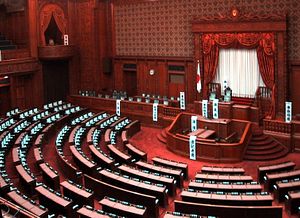Japanese Prime Minister Shinzo Abe and his ruling Liberal Democratic Party swept to victory on Sunday in elections for Japan’s House of Councilors, the upper house in the country’s bicameral parliament known as the National Diet.
With a handful of seats left to declare, the ruling LDP and its coalition partner, the Komeito Party, secured 66 of 121 that were up for grabs in this election.
The opposition Democratic Party, a newly formed amalgamation of the former Democratic Party of Japan and the Japan Innovation Party, won 31 seats.
Critically, as the final seats are declared early on Monday morning, the LDP-Komeito coalition stands to win a two-thirds supermajority, granting Abe the legislative ballast that would be necessary to put any constitutional changes to a national referendum.
Any proposal to amend Japan’s post-war constitution, which notably contains the pacifist Article 9 renouncing war, would require a two-thirds majority in both the upper and lower houses of the Diet before going to a national referendum.
Turnout in the Upper House election, according to projections by Japan’s Asahi Shimbun, stood at 53.5 percent, representing a modest increase from the 52.66 percent recorded turnout in the 2014 snap elections.
Turnout in Japanese politics has been low since the December 2012 elections that returned Shinzo Abe and the LDP to power. (Abe had previously served as prime minister for one year from 2006 to 2007.)
One of the immediate takeaways from Sunday’s election results is that Abe and the LDP remain relatively uncontested as the dominant center of gravity in Japanese politics right now.
Even though decisions by the Abe cabinet (the kantei), notably to reinterpret Article 9 to allow for collective self-defense, and the poor performance of the prime minister’s eponymous ‘Abenomics’ economic policies have negatively swung public opinion on occasion, this hasn’t quite led to feedback at the ballot box for the LDP.
With the LDP-Komeito coalition ready to seize the two-thirds supermajority in the upper house, matching its strong presence in the lower house, many will be expecting a push for constitutional change, long seen as the zenith political objective by Abe and the LDP.
However, it is unlikely that despite legislative dominance, the LDP-Komeito coalition would seek to directly move to amend Article 9.
While amendments to Article 9 would facilitate Abe’s plans to make Japan a ‘normal’ country on matters of defense and national security, the issue remains polarizing in Japanese society.
Abe may instead focus his energies on proposing a more mundane and less politically polarizing constitutional amendment, such as a change to Article 96 of the Japanese constitution.
Article 96 proscribes the constitutional amendment procedure, codifying the double supermajority requirement in addition to a national referendum.
The LDP has already proposed alternative language for Article 96 and members of the party have called for an amendment push.
The Komeito Party, however, may be unwilling to support this change, bringing the constitutional amendment issue down to intra-coalition politics.
(Read previous analysis on constitutional change in Japan and listen to a recent podcast outlining the stakes in the 2016 Upper House elections.)

































